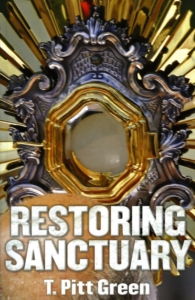By Katie Collins
The Pilot
December 29, 2010
http://www.thebostonpilot.com/article.asp?ID=12793
 |
| This is the cover of "Restoring Sanctuary" by Teresa Pitt Green, a survivor of clergy sexual abuse who said her love of the Eucharist helped restore her faith. (CNS) |
Teresa Pitt Green sat in her car in the church parking lot. She watched parishioners walk up the steps to Mass. It was so easy for them, she thought.
Unable to follow in their footsteps, she sat in the car and longed for the Eucharist. Men who consecrate the bread had betrayed her. Authorities in the church, who had entrusted the sacrament to the men, had failed her. From age 7 to 19, Green was sexually abused by multiple priests in her Northeast diocese. Her abusers worked at her school and visited her family in the evenings.
In an interview with The Arlington Catholic Herald, diocesan newspaper, Green recently recounted how, though she "left the Catholic Church forever many times," her love of the Eucharist endured, and, with the support of Arlington diocesan priests, Office of Victim Assistance programs and Arlington Bishop Paul S. Loverde, she was able, eventually, to enter a church without fear and receive the body of Christ.
Earlier this year, Green published "Restoring Sanctuary" (Dog Ear Publishing), a book part memoir, part spiritual reflection and part impetus for healing.
The book immerses the reader in the church's painful wound through the eyes of a victim, but Green does not give explicit details of abuse. But she is explicit when she defines the nature of the crime: "Sexual abuse of children is violence by sexual means by predators who seek to dominate another person by destroying their spirit."
For "predator priests," there is "a meticulous grooming of the mind to prepare it to be broken," she said. "They make themselves a false idol, the dominant power. As a sapling, it cuts to your core."
The physiological, spiritual and physical costs of Green's sexual abuse were great. In her book, she recounts her many health problems and an abusive relationship -- all, she believes, with roots in the abuse.
Yet, Green does not linger on the costs. In the chapter "Story," she writes that she reached a point where "suffering was about to be redemptive."
After years of therapy, self-help books, support groups -- often either rejecting the healing potential of Catholicism or highly suspicious of it -- and struggles with faith, Green recognized there was an "imprint of Catholic on me, an imprint of Christ on me that went deeper than any wound."
Even though she understood the imprint, and therapy had led her toward healing, she had yet to integrate her "wounded faith into the process."
"Everything seemed different" when she first spoke with Pat Mudd, coordinator of the Office of Victim Assistance in the Diocese of Arlington, and Oblate Father Mark Mealey, vicar general. Both offered two things: They recognized evil and they heard her pain, not with pity but with charity.
Any original material on these pages is copyright © BishopAccountability.org 2004. Reproduce freely with attribution.